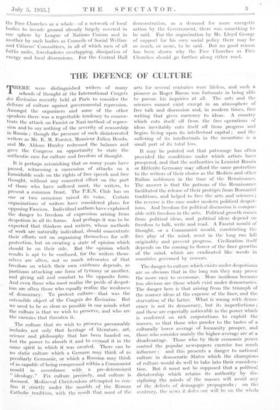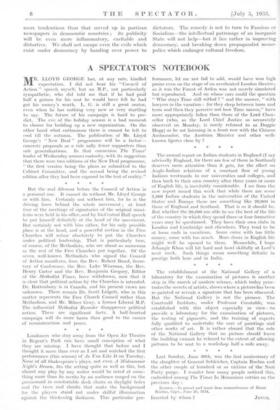THE DEFENCE OF CULTURE
THERE were distinguished writers of many schools of thought at the International Congres des Ecrivaine recently held at Paris to consider the defence of culture against governmental repression. Amongst the organizers and some of the other speakers there was a regrettable tendency to concen- trate the attack on Fascist or Nazi method of .repres- sion and to say nothing of the severity of censorship in Russia ; though the presence of such disinterested writers as Mr. E. M. Forster, Monsieur Julien Benda, and Mr. Aldous Huxley redressed the balance and gave the Congress an opportunity to state the authentic case for culture and freedom of thought.
It is perhaps astonishing that so many .years have passed, witnessing a succession of attacks on a formidable scale on the rights of free speech and free thought, without any concerted effort on the part of those who have suffered most, the writers, to present a common front. The P.E.N. Club has on one or two occasions raised its voice. Certain organizations of writers have considered plans for opposing Fascism. Individual authors have explained the danger to freedom of expression arising from despotism in all its forms. And perhaps it was to be expected that thinkers and writers, whose methods of work are naturally individual, should concentrate their efforts not on organizing themselves for self- protection, but on creating a state of opinion which should be on their side. But the opinion which results is apt to be confused, for' the writers them- selves arc often, not so much advocates of that freedom on which their own existence depends, as partisans attacking one form of tyranny or another, and giving aid and comfort to the opposite form. And even those who most realize the perils of despot- ism are often those who equally realize the weakness of demoeracy. To protect culture—that was the ostensible object of the Congres des Ecrivains. But we need to be as clear as possible in our minds what the culture is that we wish to preserve, and who arc the enemies' that threaten it.
The culture that we wish to preserve presumably includes not only that heritage of literature, art, science and philosophy . that has been handed on, but the power to absorb it. and to eynand it in the same spirit in which it was created. There can be no static culture which a German_ may think of as peculiarly Germanic,, or which a Russian may think of as capable of being. compressed within a Communist mould in accordance with a pre-determined " ideology." FiX culture precisely, and culture is doomed. Mediaeval Christendom attempted to con- fine it strictly under the moulds. of the Roman Catholic tradition, with theresult that most of the arts for several centuries were lifeless, and such a pioneer as Roger Bacon was fortunate in being able to pursue his inquiries at all. The arts and the sciences cannot exist except in an atmosphere of free talk and discussion and, in modern times, free writing that gives currency to ideas. A country which cuts itself off from the free operations of ideas inevitably cuts itself off from progress '•and begins living upon its intellectual capital ; and the suffering of its intellectuals in the meantime is a small part of its total loss.
It may be pointed out that patronage has often provided the conditions under which artists have prospered, and that the authorities in Leninist Russia or Hitlerite Germany may afford the same protection to the writers of their choice as the Medicis and other Italian noblemen in the time of the Renaissance. The answer is that the patrons of the Renaissance facilitated the release of their protégés from Romanist traditions, and helped to free the arts and sciences ; the reverse is the case under modern political despot- isms. And freedom for political discussion is compar- able with freedom in the arts. Political growth comes from political ideas, and political ideas depend on freedom to talk, write and read. A Fascist mould of thought, or a Communist mould, constricting the free play of the mind, must in the long run kill originality and prevent progress. Civilization itself depends on the coming to flower of the finer growths of the mind, which are eradicated like weeds in countries governed by censors.
The danger to culture which exists under despotisms are so obvious that in the long run they may prove the more easy to overcome. More insidious because less obvious are those which exist under democracies. The danger here is that arising from the triumph of the coarser ideas at the expense of the finer, and the starvation of the latter. What is wrong with demo- cracy is not its democracy, but its imperfections ; and these are especially noticeable in the power which is conferred on rich corporations to exploit the masses, so that those who pander to the tastes of a culturally lower average of humanity . prosper, and those who consider mainly the higher average arc at a disadvantage. Those who by their economic power control the popular newspapers exercise too much influence ; and this presents a danger to national culture in democratic States which the champions of culture would do well to take into their considera- tion. But it must not be supposed that a political dictatorship which retains its authority 'by the minds of . the masses will avoid any of the defects of demagogic propaganda ; on the contrary, the, news it doles out will be on the whole more tendentious than that served up in partisan newspapers in democratic countries ; its publicity will be even more inflammatory, excitable and distortive. We shall not escape even the evils which exist under democracy by handing over power to dictators. The remedy is not to turn to Fascism or Socialism—the intellectual patronage of an inorganic State will not help—but it lies rather in improving democracy, and breaking down propagandist mono, polies which endanger cultural freedom.















































 Previous page
Previous page